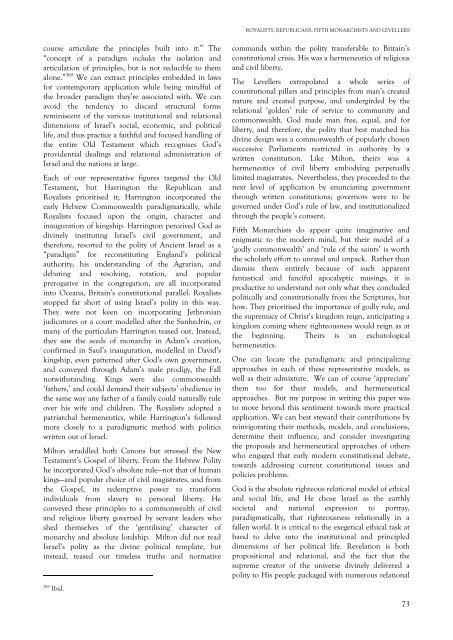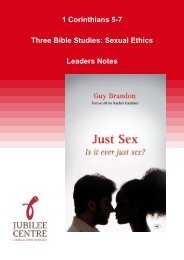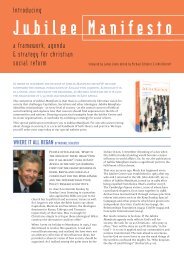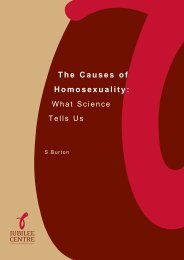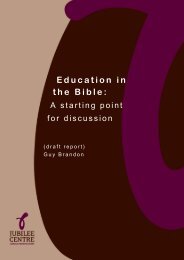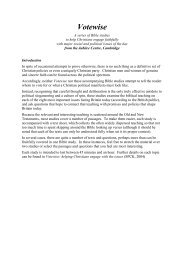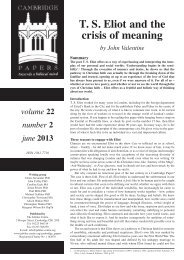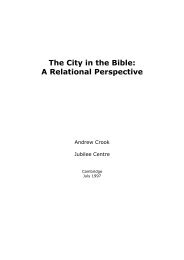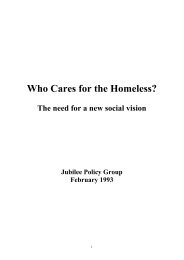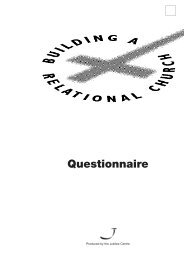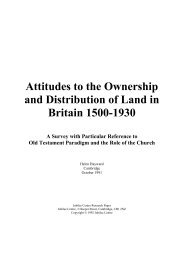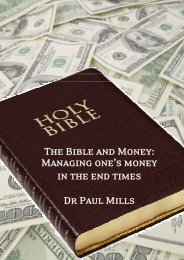Report Template - Jubilee Centre
Report Template - Jubilee Centre
Report Template - Jubilee Centre
You also want an ePaper? Increase the reach of your titles
YUMPU automatically turns print PDFs into web optimized ePapers that Google loves.
ROYALISTS, REPUBLICANS, FIFTH MONARCHISTS AND LEVELLERS<br />
course articulate the principles built into it.” The<br />
“concept of a paradigm includes the isolation and<br />
articulation of principles, but is not reducible to them<br />
alone.” 369 We can extract principles embedded in laws<br />
for contemporary application while being mindful of<br />
the broader paradigm they’re associated with. We can<br />
avoid the tendency to discard structural forms<br />
reminiscent of the various institutional and relational<br />
dimensions of Israel’s social, economic, and political<br />
life, and thus practice a faithful and focused handling of<br />
the entire Old Testament which recognises God’s<br />
providential dealings and relational administration of<br />
Israel and the nations at large.<br />
Each of our representative figures targeted the Old<br />
Testament, but Harrington the Republican and<br />
Royalists prioritised it; Harrington incorporated the<br />
early Hebrew Commonwealth paradigmatically, while<br />
Royalists focused upon the origin, character and<br />
inauguration of kingship. Harrington perceived God as<br />
divinely instituting Israel’s civil government, and<br />
therefore, resorted to the polity of Ancient Israel as a<br />
“paradigm” for reconstituting England’s political<br />
authority; his understanding of the Agrarian, and<br />
debating and resolving, rotation, and popular<br />
prerogative in the congregation, are all incorporated<br />
into Oceana, Britain’s constitutional parallel. Royalists<br />
stopped far short of using Israel’s polity in this way.<br />
They were not keen on incorporating Jethronian<br />
judicatures or a court modelled after the Sanhedrin, or<br />
many of the particulars Harrington teased out. Instead,<br />
they saw the seeds of monarchy in Adam’s creation,<br />
confirmed in Saul’s inauguration, modelled in David’s<br />
kingship, even patterned after God’s own government,<br />
and conveyed through Adam’s male prodigy, the Fall<br />
notwithstanding. Kings were also commonwealth<br />
‘fathers,’ and could demand their subjects’ obedience in<br />
the same way any father of a family could naturally rule<br />
over his wife and children. The Royalists adopted a<br />
patriarchal hermeneutics, while Harrington’s followed<br />
more closely to a paradigmatic method with politics<br />
written out of Israel.<br />
Milton straddled both Canons but stressed the New<br />
Testament’s Gospel of liberty. From the Hebrew Polity<br />
he incorporated God’s absolute rule—not that of human<br />
kings—and popular choice of civil magistrates, and from<br />
the Gospel, its redemptive power to transform<br />
individuals from slavery to personal liberty. He<br />
conveyed these principles to a commonwealth of civil<br />
and religious liberty governed by servant leaders who<br />
shed themselves of the ‘gentilising’ character of<br />
monarchy and absolute lordship. Milton did not read<br />
Israel’s polity as the divine political template, but<br />
instead, teased out timeless truths and normative<br />
369<br />
Ibid.<br />
commands within the polity transferable to Britain’s<br />
constitutional crisis. His was a hermeneutics of religious<br />
and civil liberty.<br />
The Levellers extrapolated a whole series of<br />
constitutional pillars and principles from man’s created<br />
nature and created purpose, and undergirded by the<br />
relational ‘golden’ rule of service to community and<br />
commonwealth. God made man free, equal, and for<br />
liberty, and therefore, the polity that best matched his<br />
divine design was a commonwealth of popularly chosen<br />
successive Parliaments restricted in authority by a<br />
written constitution. Like Milton, theirs was a<br />
hermeneutics of civil liberty embodying perpetually<br />
limited magistrates. Nevertheless, they proceeded to the<br />
next level of application by enunciating government<br />
through written constitutions; governors were to be<br />
governed under God’s rule of law, and institutionalized<br />
through the people’s consent.<br />
Fifth Monarchists do appear quite imaginative and<br />
enigmatic to the modern mind, but their model of a<br />
‘godly commonwealth’ and ‘rule of the saints’ is worth<br />
the scholarly effort to unravel and unpack. Rather than<br />
dismiss them entirely because of such apparent<br />
fantastical and fanciful apocalyptic musings, it is<br />
productive to understand not only what they concluded<br />
politically and constitutionally from the Scriptures, but<br />
how. They prioritised the importance of godly rule, and<br />
the supremacy of Christ’s kingdom reign, anticipating a<br />
kingdom coming where righteousness would reign as at<br />
the beginning. Theirs is an eschatological<br />
hermeneutics.<br />
One can locate the paradigmatic and principalizing<br />
approaches in each of these representative models, as<br />
well as their admixture. We can of course ‘appreciate’<br />
them too for their models, and hermeneutical<br />
approaches. But my purpose in writing this paper was<br />
to move beyond this sentiment towards more practical<br />
application. We can best steward their contributions by<br />
reinvigorating their methods, models, and conclusions,<br />
determine their influence, and consider investigating<br />
the proposals and hermeneutical approaches of others<br />
who engaged that early modern constitutional debate,<br />
towards addressing current constitutional issues and<br />
policies problems.<br />
God is the absolute righteous relational model of ethical<br />
and social life, and He chose Israel as the earthly<br />
societal and national expression to portray,<br />
paradigmatically, that righteousness relationally in a<br />
fallen world. It is critical to the exegetical ethical task at<br />
hand to delve into the institutional and principled<br />
dimensions of her political life. Revelation is both<br />
propositional and relational, and the fact that the<br />
supreme creator of the universe divinely delivered a<br />
polity to His people packaged with numerous relational<br />
73


